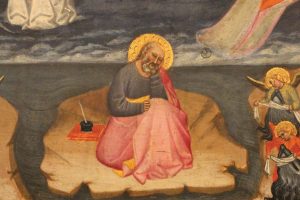Many years ago, in a period of my life when I was feeling particularly lonely, dissatisfied with my work, and uncertain about the future, I found myself thinking a great deal about the story of Lazarus. Instead of drawing hope from Lazarus’ triumphant rise from the dead, I felt no great solace. In fact, much the opposite.
I decided to explore these feelings in a poem. I wrote a rather cynical sonnet in the voice of Lazarus. What if Lazarus didn’t especially want to return to the dust and drudgery of daily life, I asked. What if he preferred the soundlessness of the grave to the bickering voices of his sisters? What if he chose the dreamland of death over the discontent of a poor man’s life? “No one asked me if I wanted to return,” Lazarus says in my poem. He contemplates the “cruel trick” he is asked to endure. He is the only human being in history who must live and die twice.
There are many ways to read the Lazarus story. On one level, it foreshadows Christ’s imminent crucifixion and subsequent resurrection. It offers one of the clearest portraits of Jesus’ compassion, driven home by the phrase, “And Jesus wept.” It presents us once again with a chance to identify with the clueless disciples who seem incapable of comprehending the amazing events they witness. And it gives us a chance to smile at the distinctions between practical Martha and the ethereal Mary (Mary prays at her brother’s wake; Martha worries about the stench of death).
Once again this Lent, I find myself thinking of Lazarus, but this time in a totally different context. Imagine for a moment just the physical journey the poor fellow faced. There he lies, ensconced deep within the earth in a cave sealed with a stone. His cadaver is not only wrapped from head to toe in burial cloth, he even has a kerchief covering his face. Think of him hearing Jesus’ call to “Come out!” Picture him following the sound of that voice, feeling his way gingerly along the dirt walls of the cave in absolute darkness.
In the course of that underground journey, he must have felt as though he was passing through yet another eternity. (Think about of how slowly time seems to pass when we are caught in traffic and anxious to arrive at our destination). Finally Lazarus reaches the end of the tunnel. Perhaps his eyes can sense the intense desert sun even through his burial cloths. In that light, the first voice he hears is a familiar one, that of Jesus. “Untie him and set him free.”
At this stage in my life, I doubt I’d write the kind of poem I did when I was younger, questioning Lazarus choice to journey from death back to life. What the Lazarus story says to me today is that life is worth that slow uncertain slog through darkness. It spurs me to consider what ties me in place, what makes me unseeing. Is it my propensity to work too hard? My lack of attentiveness to the sacred all around me? My hoarding of grudges, my inability to let go of hurts, my constant questioning of my own self-worth? This Lent, I vow to peel off the psychic burial cloths of my own making, the soiled rags that bind me in place. There is someone calling to me at the end of my emotional burial ground. Someone who wants to lead me out of blindness, to untie me and set me free. What ties do you need to loosen? What burial cloths are binding you in place?
For more reflections in our Lenten series, click here.
Image: Illustration by Angela Cox














Add comment